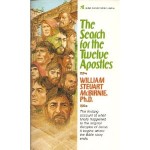Searching for the Twelve

I’m currently reading (among other things) The Search for the Twelve Apostles by William Steuart McBirnie. (FYI… this book was given to me by Eric from “A Pilgrim’s Progress” before his family moved to India, but I’m only just not getting around to reading it.) McBirnie is searching Scripture, other documents, and traditions to determine what happened (as well as can be determined) to the twelve apostles after the accounts of them in Scripture.
In his introduction, he writes the following:
The Twelve Apostles were important to the thinking of the early Christians, but were not considered be more than leaders, brothers and dearly beloved friends at first. We look upon them as the founders of churches. It took some time for their spiritual descendents to see them as the Fathers of the whole church movement. Their authority at first was in the anointing of the Holy Spirit, not in ex cathedra pronouncements on doctrine.
True, the first council of Apostles in Jerusalem gave authoritarian pronouncements concerning the admittance of the Gentile converts into the Christian movement. Yet this did not seem to have the ecclesiastical authority then that we attach to it now. We could, in face, wish there had been more pronouncements; say, concerning heresy, forms of church government, social matters, etc. But there was nothing much that came collectively from the Apostles. They simply proclaimed individually what they had heard from Jesus Christ. (pg 15-16, italics in original)
While I didn’t know what to expect from this book, I am excited about beginning with the quote above. I agree completely with the author. The “ecclesiastical position” that is given to the apostles is anachronistic – meaning, it came after they had lived and died.
In Scripture, the apostles refer to themselves as servants, brothers, or co-workers. Any authority that others attempted to give to them, they returned to all believers. They were not interested in created great organization, but in building maturing disciples of Jesus Christ.
However, as the years progressed, Christians that followed after them began to add more and more pomp and circumstance to the role of the twelve apostles.
It is going to be very interesting to see how McBirnie’s book progresses from this beginning. I’m greatly challenged by the thinking of the twelve apostles as brothers and dear friends, and leaders certainly, more mature than me and urging me on to the same level of maturity (and beyond).
What do you think of McBirnie’s statement above?
(By the way, Eric, now that you’re back in the States, you can have this book back… once I finish reading it.)

Thanks Alan. I had forgotten all about that book. I’m interested to hear what you think of it.
“any authority the others attempted to give them, they returned to all believers” reminds me of the admonishment to submit to one another and consider others more highly than myself.
Alan,
What a great quote!
I’m reminded of a few words from a song, “When will we ever learn?”
Eric,
I’ve finished the first few chapter, but had to set it aside for other reading. So far, he’s distinguished between what’s in Scripture, what is probably reliable historically, and what’s legend/myth. It’s been pretty interesting.
Bobby,
That is interesting, isn’t it? I love to submit to others, even when (especially when) they see me as a leader.
Aussie John,
Sounds like a song we need to sing more often.
-Alan